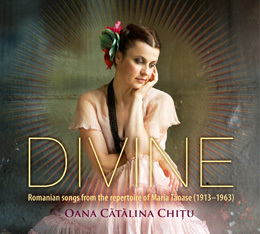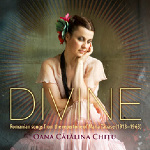- artist:OANA CATALINA CHITU
- region:Eastern Europe
- release year:2013
- style(s):Chansons, 20th Century
- country:Romania
- formats:Audio File / Digital, CD (Compact Disc), LP / Vinyl
- record posted by:Asphalt Tango Records GmbH
- label:Asphalt Tango Records GmbH
- publisher:Asphalt Tango Records GmbH
- buy this record
Links
Romanian songs from the repertoire of Maria Tănase (1913-1963)
Maria Tănase is loved in Romania like no singer that has followed her. Even before the Second World War she performed folk songs, tangos, romances, couplets and căntece de mahala, music from the suburbs, in restaurants, in revue theatres and on the radio, usually accompanied by Roma musicians, the lăutari. Tănase developed her own expressive way of interpretation, making songs of every origin her own. Then the iron curtain fell between Eastern and Western Europe. Maria Tănase was increasingly forgotten in Romania throughout the 1960s, because her dramatic doinas or the oriental-sounding songs from the mahala did not fit into the limited concept of man held by certain party officials. Maria Tănase was too much the extravagant diva and individualistic artist to allow herself to be co-opted by the state, let alone move even one millimetre towards mediocrity. And so in June 1963 she was buried like a queen at Bucharest′s Bellu Cemetery. Hundreds of thousands of people lined the streets for her final journey. It wasn′t until the 1990s before a new light was cast on the legacy of Maria Tănase. She was able to be rediscovered.
In 2013 Romanians are celebrating the centenary of Maria Tănase′s birth. This anniversary inspired the Romanian Oana Cătălina Chiţu, who lives in Berlin, to pay homage to the great singer.
Oana Cătălina Chiţu grew up in northern Romania. After the fall of the Berlin Wall and the end of the Ceauşescu regime she moved to Berlin. Upon her arrival, she founded the Balkan band Romenca with Serbian accordion player Dejan Jovanovic, but her yearning for Romanian songs and her love of the artist Maria Tănase never disappeared.
At the same time Oana Cătălina Chiţu is not an apologist, awestruck by the legacy of the Romanian diva Maria Tănase. She would like to enter into a dialogue with a phenomenal legacy which, with the exception of a few voices, has almost no creative follow-up in today′s Romanian music scene.
New Berlin acoustically encounters old Bucharest. Today musicians from both countries are once again moving as easily between the two cities as they did in the 1930s, when tango singer Jean Moscopol performed in a Berlin casino or sang in the UFA film studios. Thanks to a large number of emigrants music from the Balkans, and from Romania in particular, is better known in Berlin today than ever before; this is not restricted to a specific genre and goes far beyond the phenomenon of Balkan Beats. Oana Cătălina Chiţu is a part of this vibrant scene and her diva-like on-stage persona is reminiscent of times long past, when bohemians and intellectuals met in Bucharest′s salons.



